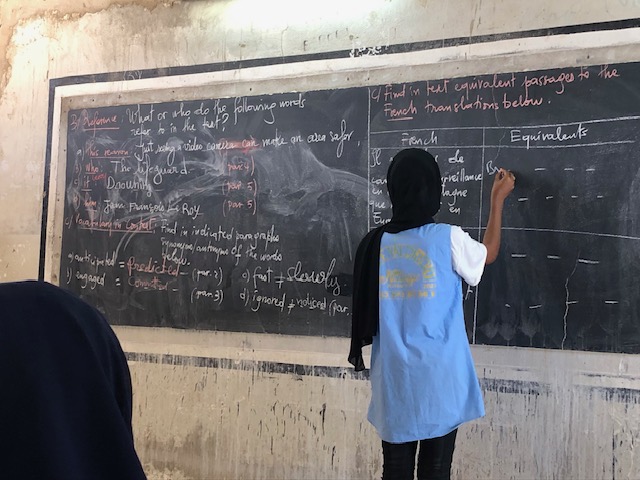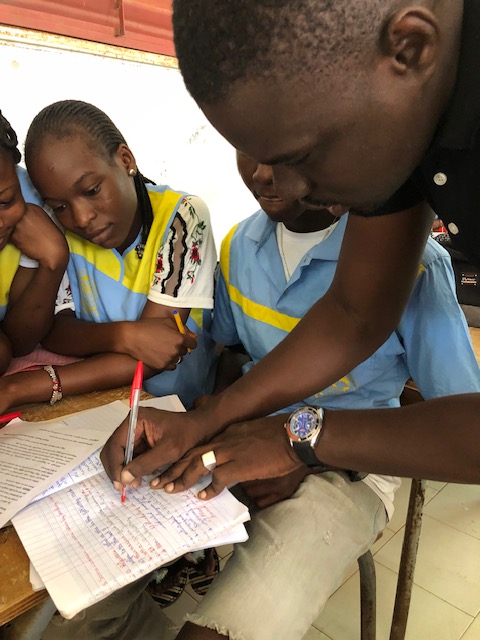Teachers everywhere share many of the same concerns. We have too many students and not enough time. We battle distractions. We wish there was less testing. We wonder whether there is more we could do to prepare our students for their future.
On Tuesday morning, my colleague Luke and I had a roundtable discussion with 10 English teachers from the Valdiodo Ndiaye High School in Kaolack, which serves 3000 students. First we explained a bit about our communities and schools in the U.S., then the conversation opened up.
The teachers wanted to know whether our students are prepared for jobs when they graduate from high school, or whether they need to attend trade or professional schools.
“We should have the trades in school,” one of the teachers said. “Like woodworking and masonry.”
The school follows a traditional French curriculum, so, he said, they study liberal arts subjects like history and geography instead, “and they say it is useless.” While he doesn’t agree with that harsh critique, he’d like to see a shift to teaching skills that are valuable in the workplace – a discussion we are having in Minnesota as well.
The teachers were baffled by my teaching assignment (economics and psychology) and the whole idea of a broad “social studies license,” since they are only licensed to teach a specific subject, like history. “To me, those two subjects do not go together,” one teacher observed.
We also discussed using formative v. summative assessments, what happens to students who fail the national baccalaureate exam (they can retake senior year), and how team teaching works in practice.
“Two teachers… in the same room… with the same students… at the same time?” they asked repeatedly. I couldn’t quite read whether they thought this was a good or bad idea.

On Wednesday, we spent our last day observing and co-teaching Aly’s four classes, mostly two-hour blocks.
Once again, I was amazed by his skill as a teacher and his passion not just for teaching English, but for creating thoughtful, engaged citizens.
In each class, his students read and analyzed texts that he had procured, identifying perspectives and pronoun referents, evaluating arguments, finding synonyms and antonyms, and writing concise summaries.
The texts he used were consistently about heavy, thought-provoking topics: video surveillance, corruption, and women’s access to credit. He never told them what to think, but “is it right?” and “is it fair?” were frequent refrains.

Our part of most lessons was much lighter. Luke described Ohio and I described Minnesota, and we asked the students to decide which one they preferred and support it with evidence. When they shared orally, it looked like Ohio for the win – “Ohio because it allows more video surveillance”, “Ohio because it has a better basketball team” – but when they voted, it was a resounding win for Minnesota!
I did get to teach a little economics in the lesson on women’s banking, which was fun. Aly was talking about loans and risk (making an adept comparison to the risk in sports betting), and I explained how loans help people buy raw materials, so they are able to produce goods before they have earned any revenue.
I’m excited that although they are not necessarily studying economics, they learned about risk, credit and monetary unions in just the few days I was there.

At the end, after a week of collaboration, Aly wanted to know what feedback I would give him, how he could improve his teaching. I genuinely could not think of anything to say.
In the U.S., we talk a lot about connecting with students, building relationships, “meeting students where they are at”, providing feedback and helping them develop confidence as learners. We have all kinds of systems in place to help us, including in many cases a surplus of technology.
Aly has a few advantages that we don’t. An incredibly collegial staff, who take the time to talk to each other every day before school and during breaks. Close-knit families in a community where kids seem not to feel isolated or anxious. Student who are engaged and eager to learn.
But he also has a gift for doing more with less, for taking a one-page text and a chalkboard and turning it into an incredible learning opportunity. I was fortunate to get the chance to learn from him.
